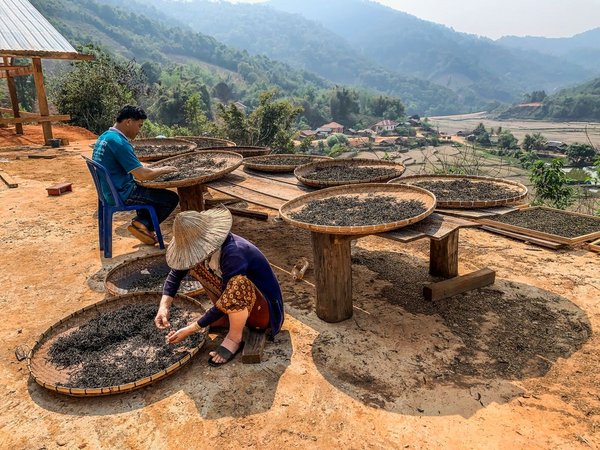 Read this article in French
Read this article in French- Share this article
- Subscribe to our newsletter
A better life with tea: SDC supports agroecological tea planting in Laos
A floral aroma, a hint of herbs and balanced bitter notes give green tea from Laos its rich and complex flavour. It is plucked by hand from the gnarled, wide-spreading branches of tea trees (Camellia sinensis) of which there are about 46 000 in Phongsali, the province in the upper north of the country wedged between China and Vietnam.
The organic wild tea is very popular among connoisseurs. Unlike the tea bushes in large-scale plantations, these tea trees grow in a cool, moist climate over 1 200 metres above sea level. They can grow up to ten metres in height, making them difficult to climb. Plucking the tea leaves is consequently hard work.
Better incomes, better biodiversity
The Lao Upland Rural Advisory Project of Swiss Development Cooperation (SDC), implemented by the Swiss NGO Helvetas, has been working to upgrade this niche product because it has the potential to promote economic development in the region. This involves supporting smallholder farmers to organise, developing sustainable value chains and facilitating market access. In addition to tea, the project also focuses on coffee, rice and maize.
The objective is the same for all crops: improve food security and the incomes of smallholder farmers while conserving the forests and biodiversity of the mountainous regions. In Laos, over 60 per cent of the population is engaged in agriculture and trading non-timber forest products, thus contributing to poverty reduction in remote and rural regions.
To increase tea production and meet rising demand, the farmers started collecting tea seeds from the forest and sowing them in the vicinity. The new tea leaves are of high quality and are easier to pluck. "The situation has improved considerably due to the tea plantation. We can send our children to school and buy food," says Chanmany, a female tea farmer. She lives in Phouxang, a village in the Oudomxay province in the north-western part of the country, where the project is also being implemented.
Once the tea leaves have been plucked, they are processed and dried in special chambers. The tea is also stored there until the producers jointly sell it. "This puts us in a better bargaining position, and we are able to obtain higher prices," explains Somphet Phomtayaxai, the community leader in Phouxang. Since China is the main buyer of Lao tea, it generally dictates the price.
Sharing knowledge
Exchange visits are organised with other regions to develop technical skills and better understand the producer market. The farmers in Phongsali have shared their experiences with those in Oudomxay and Xieng Khouang, who in turn will transmit these to their counterparts in Houaphan. The training centre in Yot Pieng provides a platform for sharing knowledge. It conducts agroecological studies with the farmers and organises producer and seller groups.
Once trained, the participants share their knowledge with tens of thousands of other farmers. Tried and tested methods are passed on by means of a handbook and social media. "For farmers, their colleagues are a more trustworthy source of information than external experts," explains Helvetas project director Andrew Bartlett. This kind of horizontal knowledge transfer also adapts itself to local environmental conditions and market developments.
Economic integration of women
The Lao Upland Rural Advisory Project is also aimed at upgrading the role of women in agriculture. Female farmers are trained in community development so that they can transmit their knowledge in the local language. "They use a tablet with educational materials, mainly videos of successful methods used by other female farmers. In return, they receive a modest monthly stipend," explains Bartlett. An equal number of men and women take part in the exchange visits.
Supporting the youth
A second centre for tea farmers is currently being constructed in Houaphan province. There are other centres for coffee, rice and maize producers as well as for young agri-entrepreneurs. These 18 to 28-year-olds are unemployed and often belong to ethnic minorities. They undergo internships in start-up companies, learn to prepare a business plan, receive technical support and are given individual guidance in establishing a micro enterprise.
The young entrepreneurs then serve as an inspiration for the next generation. They are able to expand their agroecological knowledge, improve cultivation methods and capture new markets. Ultimately, they contribute to the economic and social development of their country.
Author: Zélie Schaller, editor one-world magazine
This article was taken from one-world magazine, No 4/20





Add a comment
Be the First to Comment